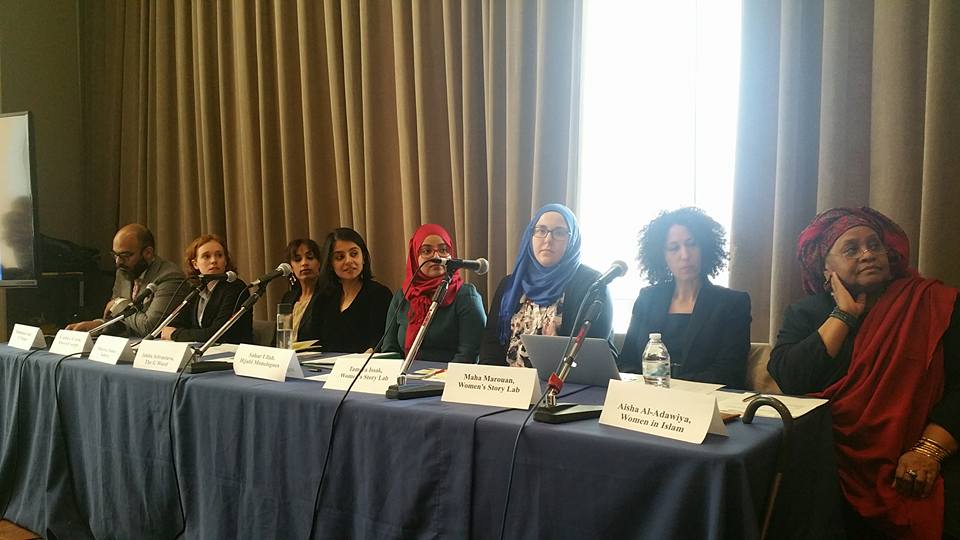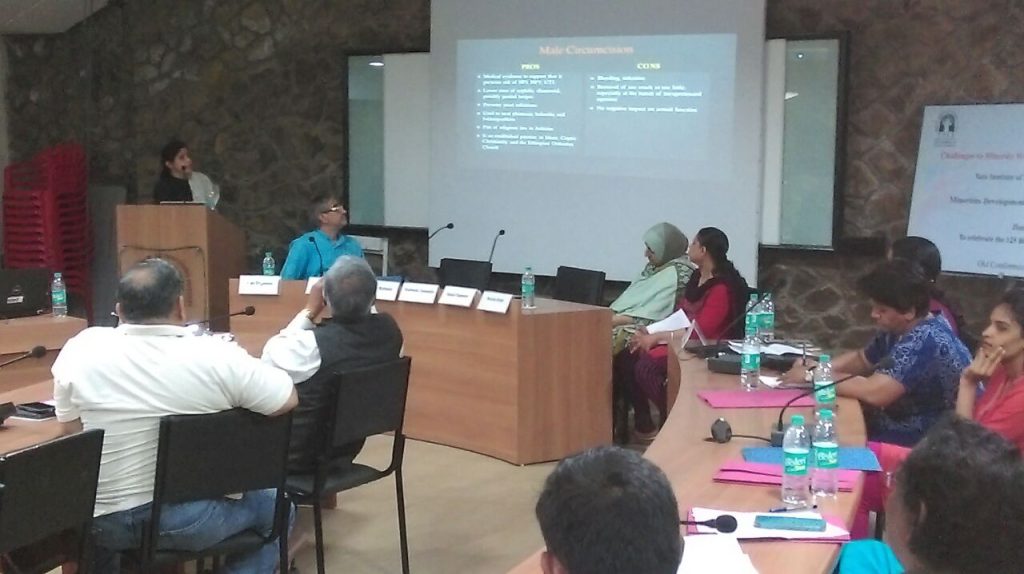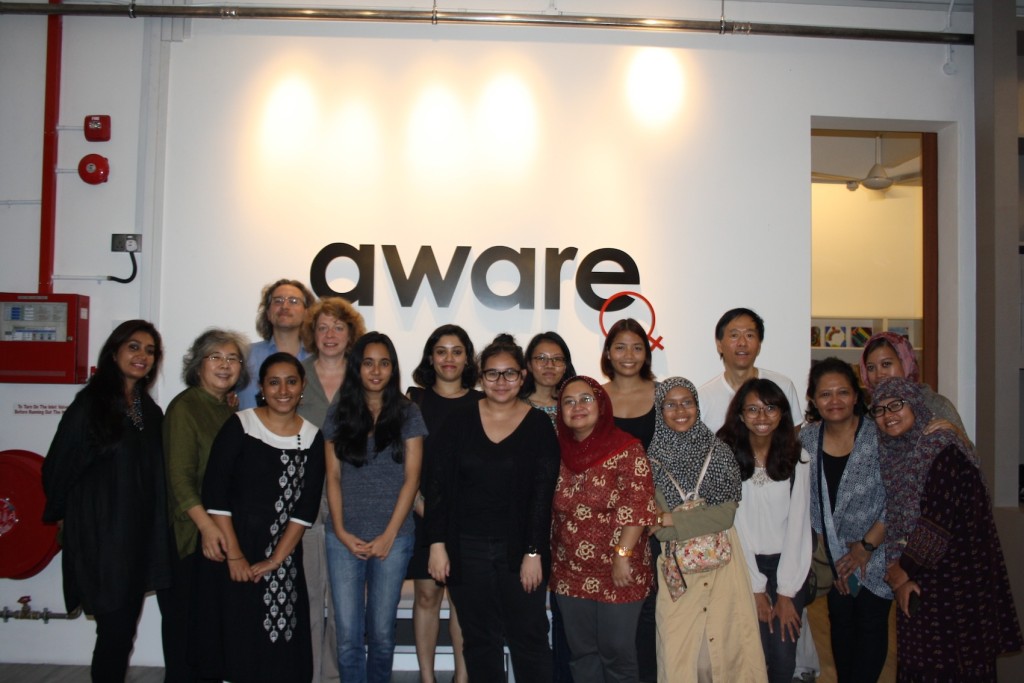Sahiyo Speaks at United Nations for Commission on the Status of Women Annual Conference

On March 21st, Mariya Taher spoke at a Commission on the Status of Women (CSW) side event entitled: Empowering Muslim Women through Storytelling: A Roundtable Discussion. Sponsored by the Permanent Mission of the United States of America to the United Nations Permanent Observer Mission of Organization of Islamic Cooperation to the United Nations, the event sought to showcase how storytelling can inspire social change and focused specifically on how storytelling platforms can be used to amplify the voices of Muslim women worldwide, particularly with the rise of Islamaphobia. The panel highlighted storytelling collectives like the Muslim Women’s Story Lab and Hijabi Monologues, organizations that have created platforms for Muslim women to reclaim their own narratives, whether discussing issues of women’s leadership and mosque access to rising anti-Muslim sentiment and questions around race and solidarity with broader social justice movements. Mainstream storytelling initiatives, such as StoryCorps, were also part of the panel as they have sought to engage diverse communities, including Muslim women, through community-based outreach. Lastly, Breakthrough’s the G word and Sahiyo’s new FGM/C storytelling initiative were asked to speak as part of this panel as these organizations aim to spark discussion on gender identity and gender-based violence through interactive digital platforms. Speakers included: Women in Islam, Inc. founder, Aisha al Adawiyah StoryCorps producer, Cailey Cron Muslim Women’s Story Lab Aisha al Adawiyah, Maha Marouan, and Tamara Issak. Hijabi Monologues founder, Sahar Ullah Sahiyo co-founder, Mariya Taher Breakthrough’s the G word, Ishita Srivastava UN Women’s Mohamed Naciri To read more about the event, click here. To learn more about work that Sahiyo is doing, visit our website at www.sahiyo.org.
Sahiyo Participates in “Challenges to Minority Women’s Rights and Development in Maharashtra” Roundtable.

Human Rights Day Panel at New England School of Law

On March 10th, 2016, Sahiyo Co-founder, Mariya Taher, will be speaking on the Human Rights Day Panel at the New England School of Law in Boston. More details are below: Topic: A Poignant Discussion on Female Genital Mutilation Date: March 10, 2016 Time: 4:00 pm Location: New England School of Law – 154 Stuart St, Boston, MA 02116; Cherry Room Guest Speakers: Susan McLucas, Mariya Taher, Katie Cintolo, Dina Haynes Sponsored By: International Law Society, Immigration Law Society, Charles Hamilton Houston Enrichment Program, Center for International Law and Policy
Wadi and Aware organize first ever conference on Female Genital Mutilation/ Cutting in Singapore

(Originally published on Stop FGM Middle East on January 9, 2016. Republished here with permission). By Hannah Wettig Women from Malaysia, Thailand, India and Singapore joined on Thursday in Singapore to present their perspectives on FGM/C in their countries and discuss ways to eliminate the practice. It is the first time that such a meeting took place in Singapore and even in South East Asia as a whole, assumes Vivienne Wee, a founding member of the Singaporean women’s organization Aware. The Singaporean feminist organization organized the conference together with WADI as part of WADI’s Stop FGM in the Middle East & Asia campaign. Female Genital Mutilation/Cutting (FGM/C) has not been a topic for us, says Vivienne Wee, a founding member of the Singaporean women’s organization Aware. It is known that it is prevalent among the Malay community and other Muslim communities in Singapore. But to what extend and how severely girls are cut is not known. There are no studies, yet. Similarly, no studies exist for Thailand, India or other countries in the region like Sri Lanka where FGM is known to be practiced. John Chua, professor for film and associate of WADI also mentioned in his presentation communities in Cambodia and Dagestan who practice FGM. “There is so much, we don’t know yet about FGM in Asia”, Chua said. Professor Maznah Dahlui shows participant what exactly is removed in which case To overcome this lack of information the meeting included a training on how to conduct surveys on FGM. Stop FGM Middle East campaigner Hannah Wettig presented the newSurvey Tool Kit developed by Wadi with the support of the Wallace Global Fund. A first survey has been started in Singapore. Activists suspect that little is cut if at all. Common in the region are practiced like nicking, pricking and scratching of the skin above the clitoris as Professor Maznah Dahlui reports in her presentation. She is one of the most renown experts on FGM/C in Malaysia. In a survey she conducted only 22,2% of mothers who had their daughter “circumcised” reported that the tip of the clitoris had been cut, 33,3% reported the skin had been scratched, others called it a pricking or nicking. While in Malaysia still most girls are brought to a traditional midwife (69%), in Singapore it can be assumed that all “circumcisions” are undertaken by professional medical personelle because traditional midwifery is illegal. Speakers from Thailand say FGM/C is not their concern The Singaporean feminists from Aware are particularly concerned with the compromising of medical professions. Singapore is a secular state, yet an operation is carried out for religious and non-medical reasons. In all of South-East Asia the practice is viewed as a religious need. In Indonesia and Malaysia the Muslim bodies have called it compulsory. Such a statement was also released by the Muslim Council in Singapore but is taken down from their website now, Filzah Sumartono from Aware explains. The issue is still strongly tabooed. Such a practice does not seem to fit to Singapore’s modern image. However, the government does not interfere in the business of the religious communities, explains Filzah. Also feminists are afraid that discussing it might alert the fundamentalists. In Southern Thailand, the question is not a concern of women’s organizations, says Huda Longdaewa. There are more pressing issues like the repression of Muslims and the violent conflict in the district of Patani whose people are demanding independence and stricter Sharia rules. The two participants of Thailand believe the type of FGM/C practiced in their country is not causing any problems. However, the filmmaker John Chua who has just visited Patani, reports how he spoke with a midwife who admitted to still practice female circumcision even though her license has been revoked because she is nearly blind. Insia, Areefa, and Priya from the Indian Group Sahiyo The Indian group Sahiyo (meaning “friends”) find much stronger words against FGM. “It is like a sexual assault”, says Areefa Johari who has spoken out publicly as a victim of FGM/C. There is also the fear of being expelled from the community. The Dawoodi Bohra, a small well-to-do community, are not traditional or fundamentalist Muslims. On the contrary, they are in many aspects modern and cosmopolitan. Female circumcision seems to be a marker: “If you are not cut, you are not Bohra”, explains Insia Dariwala, who was saved from being cut because of a catholic mother but feels that she is not accepted in the community.
